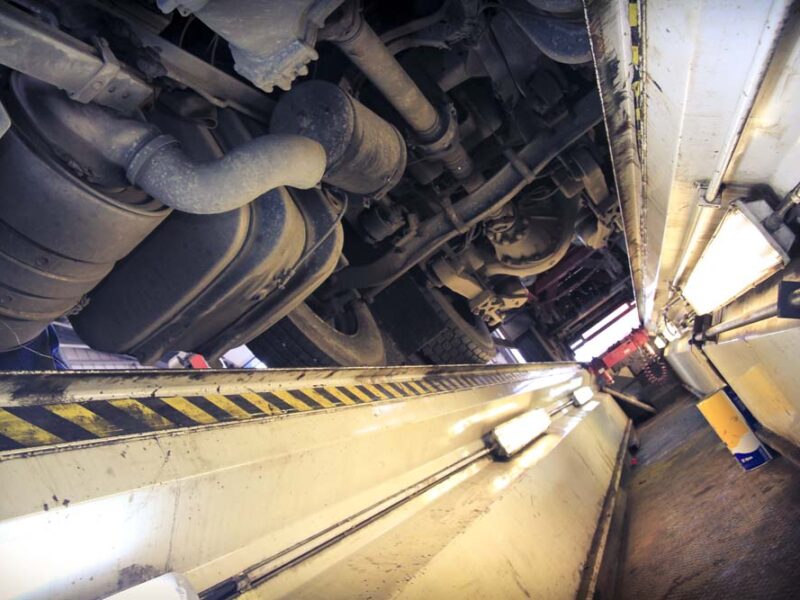One of the Oxford Dictionary definitions of an "audit" provides the following:
"an official examination of the quality or standard of something" (Emphasis added).
This definition bears a particular relevance to the context in which compliance systems auditing is used in commercial vehicle operations. It is not uncommon (and as we explain below, it has become increasingly more common as an effect of the Covid-19 pandemic) for operators to be required by Traffic Commissioners to commission independent audits of their compliance systems. Keeping in mind the truth purpose of the audit should help operators to ensure that they extrapolate maximum value from the process as well as avoiding potentially serious regulatory pitfalls.
The increased use of audit undertakings
Most operators will be aware that the idea of a systems compliance audit is not new. For several years, numerous providers have offered systems audit services as a means for operators to 'see how they are doing'. For some, commissioning these audits may be a voluntary process. For others, an audit may be required to fulfil and undertaking imposed by a Traffic Commissioner. Either way, the broad purpose of the audit is the same: to have an independent party carry out an assessment of the operator's current systems and procedures for compliance with a critical eye, identifying areas which require improvement.
At the peak of the first Covid-19 lockdown, all of the Offices of the Traffic Commissioner were forced to close. As a result, a number of hearings were cancelled or postponed. Given the inevitable backlog of cases that this created, the availability of hearing time once the tribunals re-opened was limited, so the most serious cases (or those with the most urgent road safety concerns) were prioritised for hearings ahead of the less serious cases.
One of the effects of this build-up of cases requiring regulatory input is that where appropriate, there has been an increase in the use by Traffic Commissioners of compliance audit undertakings as a means of monitoring the performance of operators that have popped up on the regulatory radar. In this way, the need to attend a hearing is avoided (at least initially - see below) but the Traffic Commissioner is still provided with valuable information on the operator's compliance performance which can inform what further steps, if any, will follow.
These compliance audit undertakings generally require the operator to arrange an independent systems audit by a specified date, with the audit report to be supplied to the Office of the Traffic Commissioner usually within 2-4 weeks of the audit visit. Importantly, the undertaking commonly also requires the operator to provide its proposals for implementing any recommendations made by the auditor, usually at the same time as supplying the report.
Done properly, this compliance audit process presents operators with a golden opportunity to avoid what might otherwise have been a difficult hearing and the risk of immediate regulatory action.
Conversely, a failure in relation to any part of the audit process (and as we will set out below, there are a number of possible pitfalls to avoid), could land the operator in an even worse position.
Getting the Audit Right
Obvious as it may sound, before instructing an auditor the operator should carefully review the wording of the undertaking. Often, there are specific requirements as to the content and format of the audit, perhaps informed by the types of issues in relation to which the operator has found itself under the microscope in the first place. There may also be a stipulation as to the qualifications of the auditor and in certain cases, specific providers may even by named.
Even absent anything specific in the wording of the undertaking, there is published OTC guidance on the correct content and format of audits which should be followed. Operators should not be apologetic about asking the auditor directly whether they are familiar with this guidance - and should keep in mind that it is for the operator to provide the auditor with instructions as to what is needed. If the audit report is not assessed as meeting the requirements because of an issue with the content, or format, the operator (not the auditor) will be held responsible.
As above, there are many providers of audit services. As in all things, there is variation in quality - it is vital to ensure that the auditor is suitably experienced, qualified and knows exactly what is required. it is self-evidently crucial to find out at the time of making enquiries what the auditor's capacity is, mindful that there will be a deadline (it is no good booking an audit on the last day before it is due if the auditor is not then able to produce the report on time). An O-licence undertaking is the sum of all its parts - failing to get the audit report submitted on time will almost certainly be viewed as a failure to comply with the undertaking (no matter how good the late audit report is). This, undoubtedly, is public inquiry territory.
Preparing for the Audit
Consider again the dictionary definition quoted above: the purpose of the audit is an examination of the quality or standard of the operator's compliance systems. Via the audit report, the Traffic Commissioner is asking for an independent view on how compliant an operator is - so there is an obvious rationale to ensuring that by the time of the audit, the report that will be produced will be as positive as it can be.
Operators ought to go through the TC audit guidance in advance in order to form a view as to where they are in relation to each of the items to be checked as part of an audit. Some auditors may be willing to send the operator a blank copy of the report template they will use so that operator can carry out its own 'dry run' - it is certainly worth asking. What is important is that the operator is well-prepared.
The Response to the Audit
Perhaps the most crucial element of the whole process is the way in which the operator deals with responding to the auditor's recommendations. Frankly, no matter how well prepared an operator may be, it is highly unlikely that there will be nothing that a competent auditor has to suggest (and operators should treat a 100% perfect audit with an element of suspicion - the Traffic Commissioner certainly will).
Upon receipt of the report, in addition to sense-checking that it is complete, covers everything it should and is correctly formatted (reference again the OTC guidance), operators should check that the findings are reflective of what the operator believes was shown to the auditor. Whilst the auditor must, of course, remain independent (so it is plainly inappropriate to ask the auditor to re-write negative elements of the report if they are accurate), the operator is fully entitled to raise queries where it appears the auditor has misunderstood something - or just made a mistake.
Assuming that the report is a true reflection, the operator should then set about producing a detailed written response. Each individual recommendation should be explicitly referred to, and in relation to each the operator should set out a response to the recommendation. In most cases, this is likely to involve realistic, achievable plans to implement the recommendations, to include a feasible timetable. Yet equally, it should be borne in mind that these are recommendations, not stipulations. Whilst the benefit of good auditors is their experience and expertise, they do no have the final say; if something that the auditor has recommended is simply not feasible, or the operator has a genuine objection to, then - being mindful always of the rationale for the recommendation - the operator is entitled to form an alternative view, as long as it is explained. What is important is that it is clear to the Traffic Commissioner that the operator has applied genuine consideration to each of the recommendations.
Most fundamentally, the operator will be held to the promises made in this document - so operators should be wary of saying they will do something which is unrealistic.
Regulatory Risk
As well as being late on submitting the audit, any shortcomings in the format and content of the audit, or failing to produce a suitable response at all, will be regarded as a failure to comply with the undertaking. This, again, is public inquiry territory.
Then, of course, the findings of the audit and the content and quality of the operator's response will be scrutinised by the Traffic Commissioner, and glaring compliance issues (or failures to respond to them properly) will very likely trigger a further call-up to Public Inquiry.
All of that said, following the process properly might just be the saving of an operator's licence!
If you need any further assistance with this matter you can click here (for HGV) or here (for PSV) to find more information on our Operator Health Checks or why not call now on 01279 818280 or click here to send an email!
(C) Richard Pelly - Article first Appeared in Corner-I March 2021

More News and Insight

Social Media – Have you Thought about your Employees’ Use?
Social Media is all encompassing in the modern world, but although it brings many positives, it can place employers in vulnerable positions if their employees’ use is not carefully defined…

Changes to the Clandestine Entrant Civil Penalty Scheme means a Stitch in Time Really Does Save Nine!
The Clandestine Entrant Civil Penalty Scheme has been in place for over 20 years. It is designed to complement law enforcement activity against criminals who smuggle people into the UK illegally as well as deter those who decide to try to enter the country without permission…

Driving in the UK? Read about the latest Rule Changes in 2024
Earlier this year various new driving laws were introduced, impacting both standard road users as well as HGV and PSV road users across England, Wales & Scotland. If you are driving in the UK, especially if you are a commercial driver, then you should ensure that you are aware of these amendments and new rules…

Self-Driving Cars on UK Roads to be Reality by 2026
It seems that one of the first areas that will be breaking the ground in the AI revolution into most people’s everyday lives will be Self-Driving cars! Of course we have heard all this before, and more than once!

Are You Taking your Responsibilities to Maintain your Vehicles Seriously?
Running a haulage business is not an easy undertaking. There are a multitude of decisions to be made on a daily basis before any driver actually gets behind the wheel and delivers the goods (or passengers!).

Update to the Guide to Registering & Operating Local Bus Services in England & Wales
The Senior Traffic Commissioner’s guide to registering and operating local bus services in England and Wales is intended to help operators of local bus services understand the requirements for registering a service.

Changes to the HGV & PSV Test Regime for Earned Recognition Operators
In March 2021 the Government began a review into the processes for commercial vehicle testing to look at ways it could improve the regime for operators whilst still maintaining high safety standards for any vehicle used commercially on the UK’s roads.

Employment Law Updates for 2024
The Government has confirmed several legislative employment law changes to be implemented 2024, which aim to bring about a “fairer workplace for employees”.

Campaign to Bar Schools from using Section 19 Permits
In March 2024 a campaign was started to end the operation of minibuses by schools and colleges under Section 19 permits.

Moving to a Digital First Approach in Heavy Vehicle Testing
The DVSA has published an update to their digital transformation project for heavy vehicle testing. The update is for the new Manage Your Vehicle Testing (MyVT) digital service across vehicle testing.

Traffic Commissioner Highlights Abuse of Section-19 Permits
In a Section 19 Public Inquiry hearing heard last year (2023) the Traffic Commissioner highlighted again the importance of permit operators ensuring that their vehicles allow passengers and other road users to be safe.

Enero Logistics Ltd – the Law for Operators on Agency Drivers
At one time or another, many transport companies need to rely on the services provided by agency drivers, to best cope with sudden fluctuations in demand or to fill driver shortages. This allows for the undisrupted continuation of services by these organisations.
